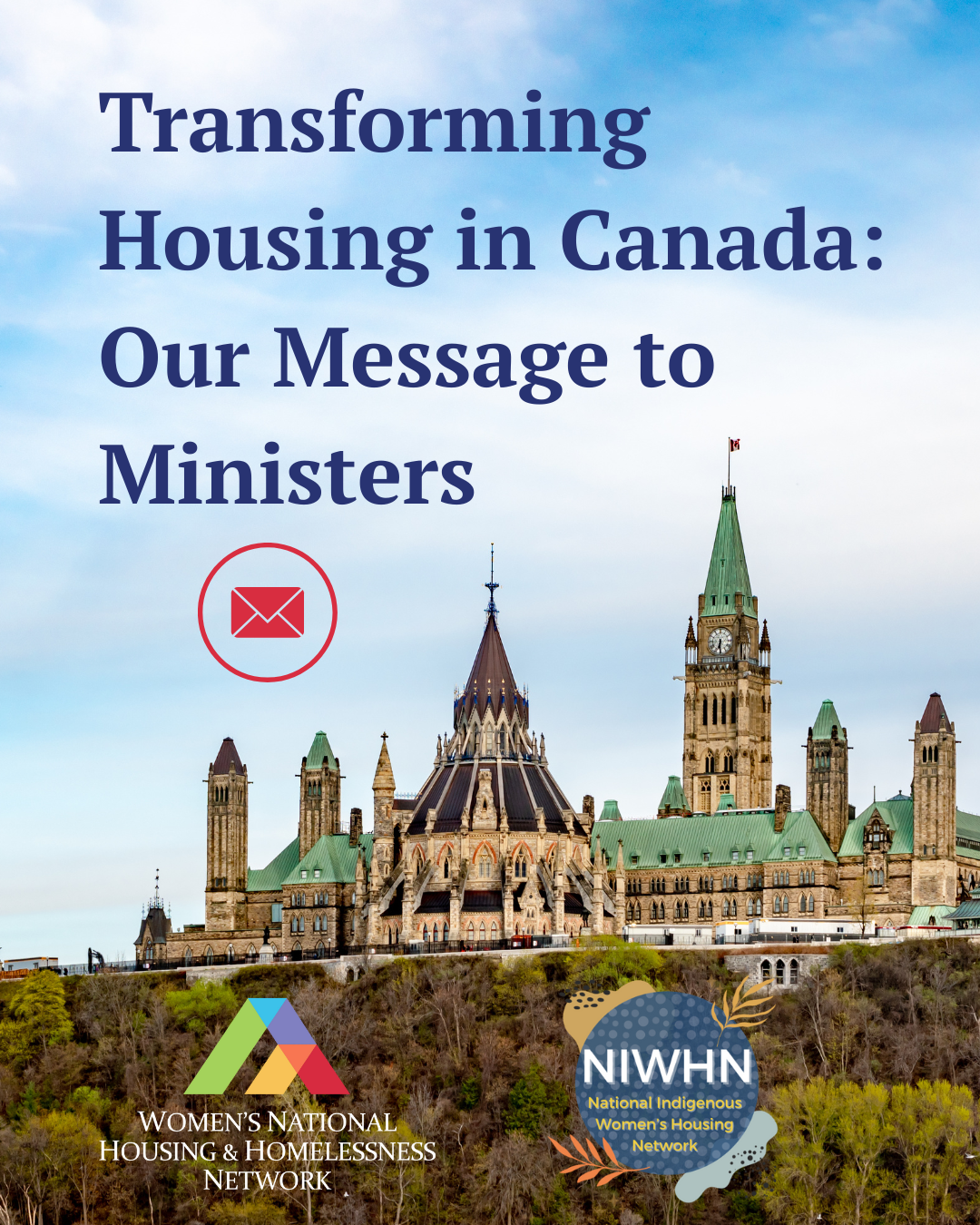We call for transforming Canada’s housing system to work for women, Two-Spirit, trans, and gender-diverse people in letters to new federal ministers
 Canada stands at a pivotal moment. The intersecting crises of homelessness, gender-based violence, and economic inequality continue to push women, Two-Spirit, trans, and gender-diverse people—especially Indigenous people—into deeper precarity. These outcomes are not inevitable; they are the result of policy choices, systemic neglect, and a failure to centre equity in housing, income supports, and public services.
Canada stands at a pivotal moment. The intersecting crises of homelessness, gender-based violence, and economic inequality continue to push women, Two-Spirit, trans, and gender-diverse people—especially Indigenous people—into deeper precarity. These outcomes are not inevitable; they are the result of policy choices, systemic neglect, and a failure to centre equity in housing, income supports, and public services.
The Women’s National Housing and Homelessness Network and the National Indigenous Women’s Housing Network are calling for a new approach—one that is intersectional, feminist, and grounded in the leadership of those most impacted by housing injustice.
We believe the federal government has an opportunity—to act boldly. That’s why we’ve written letters to five key federal ministers, urging immediate action and long-term transformation.
Who We Reached Out To — and Why
We directed our letters to the following ministers:
-
The Honourable Rechie Valdez, Minister of Women and Gender Equality (read the letter here)
-
The Honourable Gregor Robertson, Minister of Housing and Infrastructure (read the letter here)
-
The Honourable Patty Hajdu, Minister of Jobs and Families (read the letter here)
-
The Honourable Mandy Gull-Masty, Minister of Indigenous Services (read the letter here)
-
The Honourable Rebecca Alty, Minister of Crown-Indigenous Relations (read the letter here)
Each of these ministers holds a portfolio that has potential to shape the housing and economic outcomes of women, Two-Spirit, trans, and gender-diverse people. Yet too often, policies are made in siloes—with housing policy disconnected from gender equity, homelessness disconnected from violence prevention, and Indigenous housing underfunded and chronically overlooked.
By reaching out to these five ministers together, we are sending a clear message: Canada needs coordinated, cross-ministerial leadership to address the root causes of homelessness and housing insecurity for those most impacted.
What We’re Calling For
Across all five letters, we laid out five interconnected priorities to advance housing justice and gender equity:
1. Uphold the Right to Housing for Women and Gender-Diverse People
Commit to adopting and implementing the forthcoming recommendations of the Neha Review Panel on Gender Equity and Housing. Allocate at least 40% of affordable and deeply affordable housing units to women and gender-diverse households across federal programs.
2. Advance Indigenous-Led, Gender-Responsive Housing Solutions
Increase and sustain funding under the Urban, Rural, and Northern Indigenous Housing Strategy, with dedicated streams for Indigenous women, Two-Spirit, and gender-diverse people. Ensure Indigenous-led design, implementation, and evaluation rooted in UNDRIP, the TRC Calls to Action, and the MMIWG Calls for Justice.
3. Create Gender-Responsive Homelessness Programs
Expand federal homelessness strategies to include gender-specific pathways and hidden homelessness, which disproportionately affects women and gender-diverse people. Support culturally safe, trauma-informed, low-barrier housing models and develop a GBA+ framework specific to housing.
4. Bridge the Gap Between the VAW and Homelessness Sectors
The separation between violence against women services and homelessness responses leaves too many without support. We are calling for interdepartmental coordination to ensure all women and gender-diverse people fleeing violence have access to safe, long-term housing.
5. Raise the Canada Disability Benefit to a Livable Level
Poverty is a leading cause of housing precarity. We urge the government to raise the Canada Disability Benefit to reflect the real cost of living and ensure that it is accessible, inclusive, and co-designed with disability rights advocates.
Our Vision
The path forward is clear: we need a housing system that is equitable, Indigenous-led, and rooted in human rights. A system that listens to lived experts. A system that no longer treats women, gender-diverse people, and Indigenous communities as afterthoughts.
As national networks grounded in lived experience, community advocacy, and policy expertise, we are ready to work with all levels of government to build this future. But it will take political will and real accountability. Our letters are the first step. We hope the Ministers will meet this moment with courage, collaboration, and commitment.
Let’s build a Canada where everyone has a home—and where no one is left behind.

